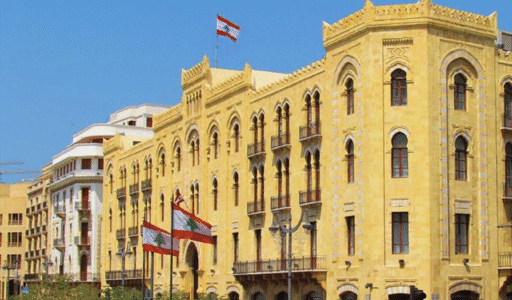A political explosion looms on the horizon No more U.S. “grace period”
May 28, 2025

A political explosion is on the horizon. No more U.S. “grace period”
The relationship between Prime Minister Nawaf Salam and Hezbollah is witnessing an unprecedented escalation.
that portends an open political clash in the coming days, amid clear external support for Salam’s positions.
and a noticeable change in the tone of US rhetoric towards Lebanon.
Will Hezbollah’s weapon be the next stop for both internal and external confrontation? Is Lebanon truly entering a phase of “breaking taboos?” And will Hezbollah’s weapon be the next stop for both internal and external confrontation?
“Zionist peace”! Chants that are not easily obliterated
In an unfamiliar scene, Hezbollah supporters chanted against Prime Minister Nawaf Salam, calling him a “Zionist” from the sports city.
in response to his recent statements that “there are no weapons outside the authority of the state” and that “the era of exporting the Iranian revolution is over.” These chants.
which did not go unnoticed, were a clear indication of the fractured relationship between the two parties.
Especially since the official response from the Loyalty of Resistance bloc came through MP Mohammed Raad from Baabda Palace.
He said that he “will not respond to President Salam in order to preserve what is left of friendliness.”
From the ministerial statement to the explosion, what changed?
Surprisingly, Hezbollah had previously given confidence to Nawaf Salam’s government based on a clear ministerial statement that explicitly stipulated “restricting weapons to the state.”
This is confirmed by political sources, asking why Hezbollah’s position has been reversed.
Was agreeing to the statement a tactical maneuver, or did Salam’s escalation cross “red lines”?
In fact, Nawaf Salam’s statements in Dubai were not just a fleeting speech in a media forum, but a clear statement of intent towards a state project that rejects “dualism of arms” and “dualism of decision”.
He said it clearly: “Our project is based on the convergence of reform and sovereignty… We want a Lebanon that owns its decision in peace and war.”
This sentence alone is enough to undermine the fragile balances adopted by successive governments since the Taif Agreement.
Unprecedented UAE and US support
On the sidelines of the Arab Media Summit 2025, President Salam met with Sheikh Mohammed bin Zayed, President of the United Arab Emirates, who reaffirmed his country’s firm position on Lebanon’s unity and sovereignty and its support for stability and development. But the most important meeting came from a more sensitive quarter: U.S. envoy Morgan Ortagus, who publicly expressed her admiration for Salam’s positions, according to diplomatic information.
Follow-up sources confirmed that Ortagus will visit Lebanon soon, and this time she will not come with soft diplomatic “advice,” but rather “specific deadlines” demanding the surrender of Hezbollah’s weapons from both north and south of the Litani. According to the same information, Washington has informed those concerned in Beirut that “there is no grace period” anymore, a phrase that reflects a major shift in the U.S. pressure strategy.
Israeli pressure and a political explosion on the horizon
The shift does not stop at the US statements. According to diplomatic leaks, Israel refuses to withdraw from the five points it still occupies in southern Lebanon unless a comprehensive agreement is reached on the 13 disputed points on the land border. This move comes as part of a series of additional pressures, including the refusal to extend the UNIFIL forces, which opens southern Lebanon to worrisome possibilities if the international forces withdraw from their positions.
This indirect threat brings to mind the equation that Tel Aviv has always adopted: Political pressure is accompanied by security pressure. Thus, the arms issue is no longer an internal affair, but a regional-international card on the table, used to arrange new balances in post-economic collapse Lebanon.
A government in the crosshairs … and a “confrontational president”
What cannot be ignored is that Nawaf Salam did not come from a traditional political background, but rather from a human rights diplomacy background, which made him bolder in raising “forbidden” issues. Perhaps it was this frankness, which was lacking in previous governments, that quickly opened the doors of confrontation for him. Just three months after his government won a vote of confidence, he was in the crosshairs of a political veto from the most powerful component of the state.
But Salam does not appear to be backing down. On the contrary, his speech in Dubai signaled a clear intention to stay the course, even if it leads to confrontation. “We will not remain silent about weapons outside the control of the state … we demand peace,” he said in an international media forum, in front of an Arab and international audience, which means that his statements are no longer intended for domestic consumption, but have become a message to the outside world that someone wants to recover the kidnapped Lebanon.
Where are things headed?
The question everyone is asking today: If the relationship between Hezbollah and the president is described as “special,” how can this be reconciled with an increasingly hostile relationship with the prime minister?
The equation has become complicated, especially since the Americans, along with the Gulf states, seem to have found in Nawaf Salam an opportunity to reintroduce the state project. On the other hand, Hezbollah does not seem willing to give up its “strategic weapon” or allow the arms file to be a negotiating item for a government with external support.
A political explosion looms on the horizon Has the “arms” battle already begun?
It is clear that Lebanon has entered a new phase, characterized by an open confrontation between the project of “full sovereignty” and the project of “weapon-based balances.” With the escalation of regional and international positions and the intensification of the economic blockade, the coming days will be decisive.
Either Nawaf Salam will succeed in imposing a new equation that restores the Lebanese state, or he will be met with a political storm that reproduces paralysis and obstruction… The decision is ultimately not in Beirut alone, but in the major decision-making capitals, from Washington to Tehran.
The post A political explosion looms on the horizon. No more U.S. “grace period” appeared first on 961 Today Lebanon Today.









